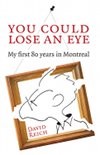
You Could Lose An Eye: My First 80 Years In Montreal
David Reich
Baraka Books
$22.95
paper
200pp
9781926824031
As a consequence, the young Reich eschewed danger, even fun, and embraced his true risk-averse nature. As he puts it: “While my friends were happily flying down hills on their skis, or roller skating in traffic … or risking dismemberment or death in a hundred ways, I was able to convince myself that caution was a cardinal virtue. I replaced these suicidal urges with more sedentary pastimes. I’ll never know what I missed. But I still have both my eyes.”
If Reich wasn’t having fun as a kid, he was, as is apparent in passages like the one above, developing a knack for finding things funny – himself in particular. You Could Lose an Eye is a self-deprecating, warm-hearted book.
Reich is at his best early on when describing his immigrant parents and the experience they shared with other East European Jews who arrived in North America at the turn of the twentieth century. “They travelled light,” Reich explains. “Their only baggage was intelligence, energy, and burning ambition. It was more than enough.” The portrait of his first-generation childhood is similarly observant. Parents expected their children to succeed, really succeed: “[They] never doubted that we had brains, but they desperately coveted … diplomas.”
But while Reich’s storytelling is lovingly detailed on the subject of his childhood, he’s much more circumspect about adulthood. There’s nothing in the book, for instance, about love or marriage or other personal relationships. We only learn that he has children on the second-to-last page.
There are also few surprises in You Could Lose an Eye, which reads, at times, like it belongs to a new, curious kind of literary genre – the authorized autobiography. For instance, details about the more difficult moments in Reich’s long, accomplished life are either overlooked or dealt with superficially. Like the workaholic he portrays himself as, Reich focuses in the middle section of the book on his business relationships and his architectural career, which is distinguished as much by the projects that Reich, risk-averse as always, said no to as those he accepted. He was, however, an astute businessman, making a good living taking on unglamorous jobs, designing, by his own description, the “dirtiest projects” – industrial sites for oil and iron ore companies.
If the book reads, at times, a bit too much like an extended CV, albeit one full of its author’s trademark quips, the final section of You Could Lose an Eye, a tribute to “those who enriched my years,” sees Reich back on track. Family stories dominate. For instance, Reich’s portrait of his father’s younger brother, Nathan, is well told. Nicknamed The Professor, Nathan was an enormous influence on Reich, who includes a series of excerpts from Nathan’s own memoir. These provide a rare, invaluable glimpse into life in the “old country,” before Nathan immigrated to North America. Similarly, Reich includes riveting passages from the lives of other family members who survived the Holocaust.
Finally, in his typically self-deprecating manner, Reich offers up his story as a font of “priceless information” about “the several thousand things” he did in his life that didn’t work out. “I may not have good advice,” he writes, “but I have lots of good stories.” As it turns out, that’s just what most readers, Montreal readers in particular, will want from You Could Lose an Eye. mRb






0 Comments